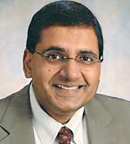
Ravi Salgia, MD, PhD
City of Hope’s Ravi Salgia, MD, PhD, Chair of the Department of Medical Oncology and Therapeutics Research, has received an accolade that recognizes his decades-long dedication to treating patients with lung cancer and researching new therapies. Dr. Salgia received the 2016 Asclepius Award from the Bonnie J. Addario Lung Cancer Foundation on November 12 at the organization’s “Simply the Best” Dinner and Gala in San Francisco, California. The foundation is dedicated to fighting lung cancer and turning it into a manageable, curable disease by 2023.
“The Asclepius Award honors Dr. Salgia’s excellence in medicine and his unrelenting focus on helping patients with lung cancer,” said Bonnie J. Addario, the foundation’s founder and a stage IIIB lung cancer survivor. “He is a strong ally in our quest to find new precision medicine therapies for lung cancer patients worldwide.”
Dr. Salgia joined City of Hope in January 2016, where he’s led the expansion of clinical programs at City of Hope’s Duarte campus and in its community practices throughout Southern California. He also works closely with faculty to support both basic research and clinical studies aimed at discovering new cancer treatments. Beyond his role as the Arthur & Rosalie Kaplan Endowed Chair in Medical Oncology, Dr. Salgia also serves as Associate Director for Clinical Sciences in the institution’s comprehensive cancer center.
“I am honored and humbled to receive recognition from an organization that is so closely aligned to my passion—finding more effective therapies for lung cancer,” Dr. Salgia said. “Together, we can make a difference in the fight against this devastating disease.”
Professional Achievements
Prior to joining City of Hope, Dr. Salgia served in various high-profile roles at the University of Chicago Medical Center and Pritzker School of Medicine, including Director of the Center’s Thoracic Oncology Program, Vice Chair of Medicine, and Associate Director of Translational Sciences for its comprehensive cancer center.
During his 12 years at the University of Chicago, Dr. Salgia identified several novel targets in oncology and led a strong clinical and research group. His laboratory conducted research on how the receptor tyrosine kinases, abundant in lung cancer cells, affect cell growth and may have potential use in treatment. Dr. Salgia’s most recent work has focused on genomic profiling of lung cancers and the development of biomarkers for early diagnosis as well as prognosis and therapeutic monitoring of thoracic cancers. Dr. Salgia is also utilizing various strategies to understand tumor heterogeneity, including the role of cell-signaling pathways, mitochondria, immunology, and mathematical modeling.
Dr. Salgia has published more than 200 journal articles, contributed to 34 books related to thoracic diseases, and served as an editor and associate editor for 6 journals. He received his medical degree and PhD in biochemistry and biophysics from Loyola University Stritch School of Medicine in Chicago and completed his internship and residency in internal medicine at Johns Hopkins Hospital. He completed a fellowship in medical oncology at Dana-Farber Cancer Institute/Harvard Medical School and remained there as a faculty member for a decade, before moving to the University of Chicago. ■

